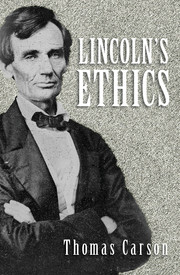Book contents
- Frontmatter
- Dedication
- Epigraph
- Contents
- Detailed Contents
- List of Maps and Figures
- Acknowledgments
- How This Book Came to Be
- 1 Introduction
- PART ONE LINCOLN THE POLITICIAN AND COMMANDER IN CHIEF
- 2 Lincoln's Evolving Policies Regarding Slavery: Compromise and Utilitarianism
- 3 Habeas Corpus, Colonization, and the Status and Rights of Free African Americans
- 4 Did the Union Have Just Cause for Fighting the American Civil War?
- 5 Jus in Bello: Did the Union Fight the War Justly?
- 6 Moral Luck and Lincoln's Good Moral Luck
- PART TWO LINCOLN'S MORAL CHARACTER
- Bibliography
- Index
- Plate Section
5 - Jus in Bello: Did the Union Fight the War Justly?
from PART ONE - LINCOLN THE POLITICIAN AND COMMANDER IN CHIEF
Published online by Cambridge University Press: 05 May 2015
- Frontmatter
- Dedication
- Epigraph
- Contents
- Detailed Contents
- List of Maps and Figures
- Acknowledgments
- How This Book Came to Be
- 1 Introduction
- PART ONE LINCOLN THE POLITICIAN AND COMMANDER IN CHIEF
- 2 Lincoln's Evolving Policies Regarding Slavery: Compromise and Utilitarianism
- 3 Habeas Corpus, Colonization, and the Status and Rights of Free African Americans
- 4 Did the Union Have Just Cause for Fighting the American Civil War?
- 5 Jus in Bello: Did the Union Fight the War Justly?
- 6 Moral Luck and Lincoln's Good Moral Luck
- PART TWO LINCOLN'S MORAL CHARACTER
- Bibliography
- Index
- Plate Section
Summary
Questions of jus in bello (literally “justice in war” – just means in fighting wars) are very crucial for an ethical assessment of Lincoln. The Union military's treatment of Confederate civilians has been widely criticized. The Civil War has often been characterized as a “total war” that imposed very harsh and ruthless treatment of Southern civilians on a very large scale. During the war Lincoln was commander in chief of the Army and Navy of the United States. In addition, he personally authorized and approved a new code of conduct for the U.S. military (formalized in the Lieber Code) that permitted much harsher treatment of civilians than some important Union leaders, most notably General McClellan, thought proper. In this chapter I argue that the Civil War was not a total war and that Lincoln's policies concerning the treatment of civilians during the war were largely, but not entirely, justified.
I. The Union Army's Treatment of Civilians
Early in the Civil War, both sides followed rules of war that required soldiers to give immunity to civilians and strictly respect the property of civilians, even when doing so hindered military operations. One notable example of how this worked in practice occurred after the Battle of Shiloh, when the Union Army moved very deeply into Confederate territory. Union General Halleck advanced on Beauregard's shattered Confederate army of 70,000, the most important Confederate military unit outside of Virginia at the time. Halleck had a chance to capture Beauregard's army if he laid siege to Corinth, Mississippi, but he refrained from doing that. Halleck allowed Beauregard's army an avenue of escape from the city because of his concern for the civilians in Corinth. General McClellan, who commanded the Army of the Potomac for more than a year early in the war, also wanted to fight a limited war.
- Type
- Chapter
- Information
- Lincoln's Ethics , pp. 191 - 217Publisher: Cambridge University PressPrint publication year: 2015

